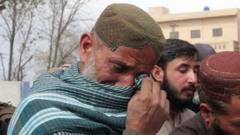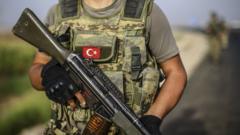The hijacking of the Jaffar Express resulted in a violent standoff with militants from the Balochistan Liberation Army. While hundreds of passengers managed to escape, the situation highlights the ongoing insurgency in Balochistan and the sacrifices made by many amidst chaos and despair.**
Terror and Resilience: The Balochistan Train Hijacking Incident**

Terror and Resilience: The Balochistan Train Hijacking Incident**
A harrowing account of the recent train hijacking in Balochistan, Pakistan, where armed militants launched an attack on the Jaffar Express, leaving casualties and survivors speaking out about their traumatic experiences.**
***
Amidst the rugged terrain of central Pakistan's Bolan Pass, a shocking act of violence unfolded on the Jaffar Express train, which was carrying around 440 passengers from Quetta to Peshawar. As the train traversed a remote area devoid of mobile coverage, the tracks exploded, bringing the train to an abrupt halt, followed quickly by a barrage of gunfire. Eyewitness Mehboob Hussain recounted the horror: “I was a passenger on the train that was attacked.”
The assailants, militants affiliated with the Balochistan Liberation Army (BLA), executed a sophisticated attack involving sabotage and firearms. The BLA claimed responsibility shortly after the incident, threatening the lives of hostages if their demands for the release of political prisoners were not met within 48 hours. Although the group has a long history of violence in the region, this incident marked a new level of audacity—hijacking a train filled with passengers.
The siege lasted more than 30 grueling hours. Authorities later confirmed that around 300 hostages have been freed, but information about the remaining passengers remains unclear, and an alarming number are still unaccounted for. The rescue operation faced significant challenges due to the militants' fortified position on surrounding hills, as an unarmed railway police officer aboard the train described witnessing the overwhelming advances of the attackers.
As night fell, the horrors continued. Survivors shared chilling tales of seeing their companions, including military personnel and civilians, killed in cold blood as the militants randomly executed those they captured. Amid the chaos, some passengers were allowed to escape based on certain criteria, such as age and ethnicity. Those who fled were faced with a treacherous journey through wilderness and gunfire.
It was only during the early hours of Wednesday, coinciding with morning prayers, that paramilitary forces finally launched an offensive against the militants, allowing a chaotic mass escape. Survivors vividly recalled narrowly escaping the onslaught when attention from the attackers shifted due to the unexpected assault.
Although military officials reported that they had neutralized the immediate threat, the fate of the remaining 140 passengers remains uncertain, and the families of those still missing are left in despair. Noor Muhammad, one of the grateful survivors, reflected on his escape, praising fate for keeping him and his wife safe: "Thank God," he stated, "He saved us."
The tragic events aboard the Jaffar Express not only reveal the terror induced by the BLA’s continued insurgency in Balochistan but also highlight the incredible resilience and fortitude of the human spirit in the face of violence. As the region navigates these turbulent waters, the plight of its people grows increasingly precarious.
Amidst the rugged terrain of central Pakistan's Bolan Pass, a shocking act of violence unfolded on the Jaffar Express train, which was carrying around 440 passengers from Quetta to Peshawar. As the train traversed a remote area devoid of mobile coverage, the tracks exploded, bringing the train to an abrupt halt, followed quickly by a barrage of gunfire. Eyewitness Mehboob Hussain recounted the horror: “I was a passenger on the train that was attacked.”
The assailants, militants affiliated with the Balochistan Liberation Army (BLA), executed a sophisticated attack involving sabotage and firearms. The BLA claimed responsibility shortly after the incident, threatening the lives of hostages if their demands for the release of political prisoners were not met within 48 hours. Although the group has a long history of violence in the region, this incident marked a new level of audacity—hijacking a train filled with passengers.
The siege lasted more than 30 grueling hours. Authorities later confirmed that around 300 hostages have been freed, but information about the remaining passengers remains unclear, and an alarming number are still unaccounted for. The rescue operation faced significant challenges due to the militants' fortified position on surrounding hills, as an unarmed railway police officer aboard the train described witnessing the overwhelming advances of the attackers.
As night fell, the horrors continued. Survivors shared chilling tales of seeing their companions, including military personnel and civilians, killed in cold blood as the militants randomly executed those they captured. Amid the chaos, some passengers were allowed to escape based on certain criteria, such as age and ethnicity. Those who fled were faced with a treacherous journey through wilderness and gunfire.
It was only during the early hours of Wednesday, coinciding with morning prayers, that paramilitary forces finally launched an offensive against the militants, allowing a chaotic mass escape. Survivors vividly recalled narrowly escaping the onslaught when attention from the attackers shifted due to the unexpected assault.
Although military officials reported that they had neutralized the immediate threat, the fate of the remaining 140 passengers remains uncertain, and the families of those still missing are left in despair. Noor Muhammad, one of the grateful survivors, reflected on his escape, praising fate for keeping him and his wife safe: "Thank God," he stated, "He saved us."
The tragic events aboard the Jaffar Express not only reveal the terror induced by the BLA’s continued insurgency in Balochistan but also highlight the incredible resilience and fortitude of the human spirit in the face of violence. As the region navigates these turbulent waters, the plight of its people grows increasingly precarious.






















